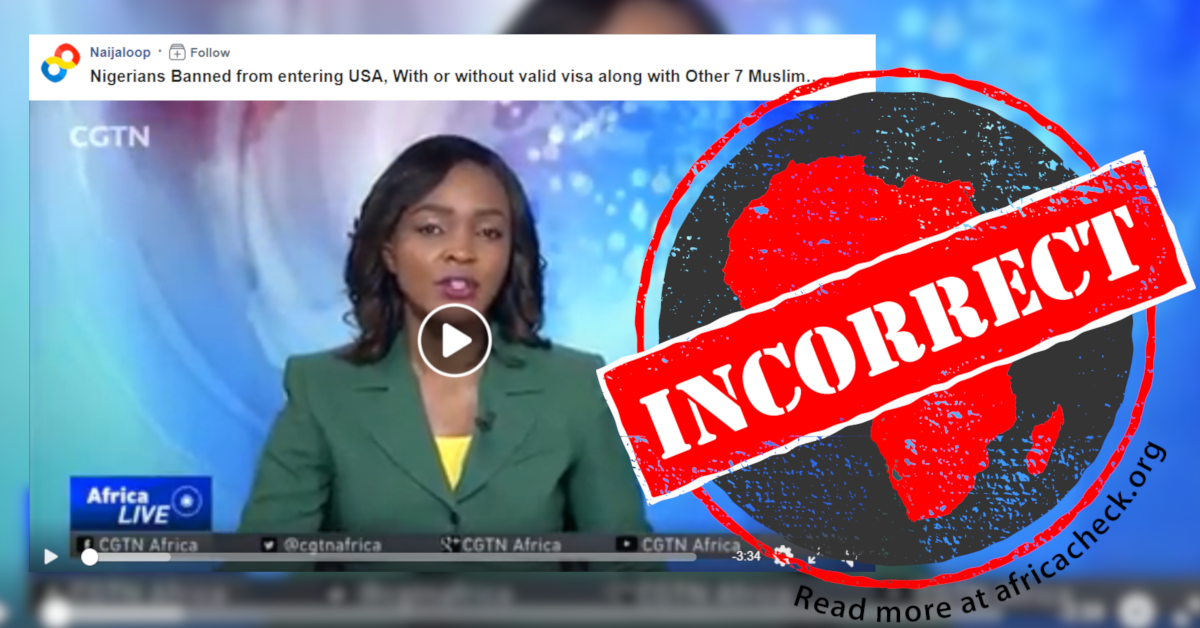A July 2019 Facebook post claims Nigerians, along with citizens of seven other countries, have been banned from entering the United States.
“Nigerians Banned from entering USA, With or without valid visa along with Other 7 Muslim countries... Nice Move By Trump... Till They Receive Sense,” it reads.
The post includes a CGTN Africa TV news report from 6 March 2017. The report was on some Nigerians travelling to the US who had been turned back at the point of entry.
This was widely reported in the media in March 2017, after US president Donald Trump signed a travel ban barring citizens of seven Muslim-majority countries from entering the US. Nigeria was not one of the countries affected by the ban.

Days after the March 2017 reports surfaced, the US Embassy in Abuja said there was no restriction on Nigerians travelling to the US.
“Nigerians with valid visas are welcome to travel to the United States,” embassy spokesperson Russell Brooks told Premium Times.
“Many people are unaware of the fact that a visa does not automatically guarantee you entry into the United States. As is the case in most countries, all travellers are still subject to an interview by an immigration official at the point of entry.”
Nigeria’s ambassador to the US, Hakeem Balogun, also said there was nothing unusual about the Nigerians with valid visas being denied entry to the US. He said the incidents had nothing to do with Trump’s travel ban.
“The executive ban on immigration does not affect Nigerians,” he told the News Agency of Nigeria in Washington. “Whatever must have taken place regarding visa issuance, vetting at the airports, it’s all normal.”
In June 2019 Africa Check debunked a similar claim circulating Facebook and other social media. This claim, rated false, was that the US had stopped issuing student visas to Nigerians.
A US Embassy tweet called the claim a “manufactured item” spreading “on Facebook and Twitter or received it via WhatsApp”. – Allwell Okpi
“Nigerians Banned from entering USA, With or without valid visa along with Other 7 Muslim countries... Nice Move By Trump... Till They Receive Sense,” it reads.
The post includes a CGTN Africa TV news report from 6 March 2017. The report was on some Nigerians travelling to the US who had been turned back at the point of entry.
This was widely reported in the media in March 2017, after US president Donald Trump signed a travel ban barring citizens of seven Muslim-majority countries from entering the US. Nigeria was not one of the countries affected by the ban.

‘Nothing unusual’ – US and Nigerian embassies
Days after the March 2017 reports surfaced, the US Embassy in Abuja said there was no restriction on Nigerians travelling to the US.
“Nigerians with valid visas are welcome to travel to the United States,” embassy spokesperson Russell Brooks told Premium Times.
“Many people are unaware of the fact that a visa does not automatically guarantee you entry into the United States. As is the case in most countries, all travellers are still subject to an interview by an immigration official at the point of entry.”
Nigeria’s ambassador to the US, Hakeem Balogun, also said there was nothing unusual about the Nigerians with valid visas being denied entry to the US. He said the incidents had nothing to do with Trump’s travel ban.
“The executive ban on immigration does not affect Nigerians,” he told the News Agency of Nigeria in Washington. “Whatever must have taken place regarding visa issuance, vetting at the airports, it’s all normal.”
Claim on student visas also debunked
In June 2019 Africa Check debunked a similar claim circulating Facebook and other social media. This claim, rated false, was that the US had stopped issuing student visas to Nigerians.
A US Embassy tweet called the claim a “manufactured item” spreading “on Facebook and Twitter or received it via WhatsApp”. – Allwell Okpi
Republish our content for free
For publishers: what to do if your post is rated false
A fact-checker has rated your Facebook or Instagram post as “false”, “altered”, “partly false” or “missing context”. This could have serious consequences. What do you do?
Click on our guide for the steps you should follow.
Publishers guideAfrica Check teams up with Facebook
Africa Check is a partner in Meta's third-party fact-checking programme to help stop the spread of false information on social media.
The content we rate as “false” will be downgraded on Facebook and Instagram. This means fewer people will see it.
You can also help identify false information on Facebook. This guide explains how.





Add new comment